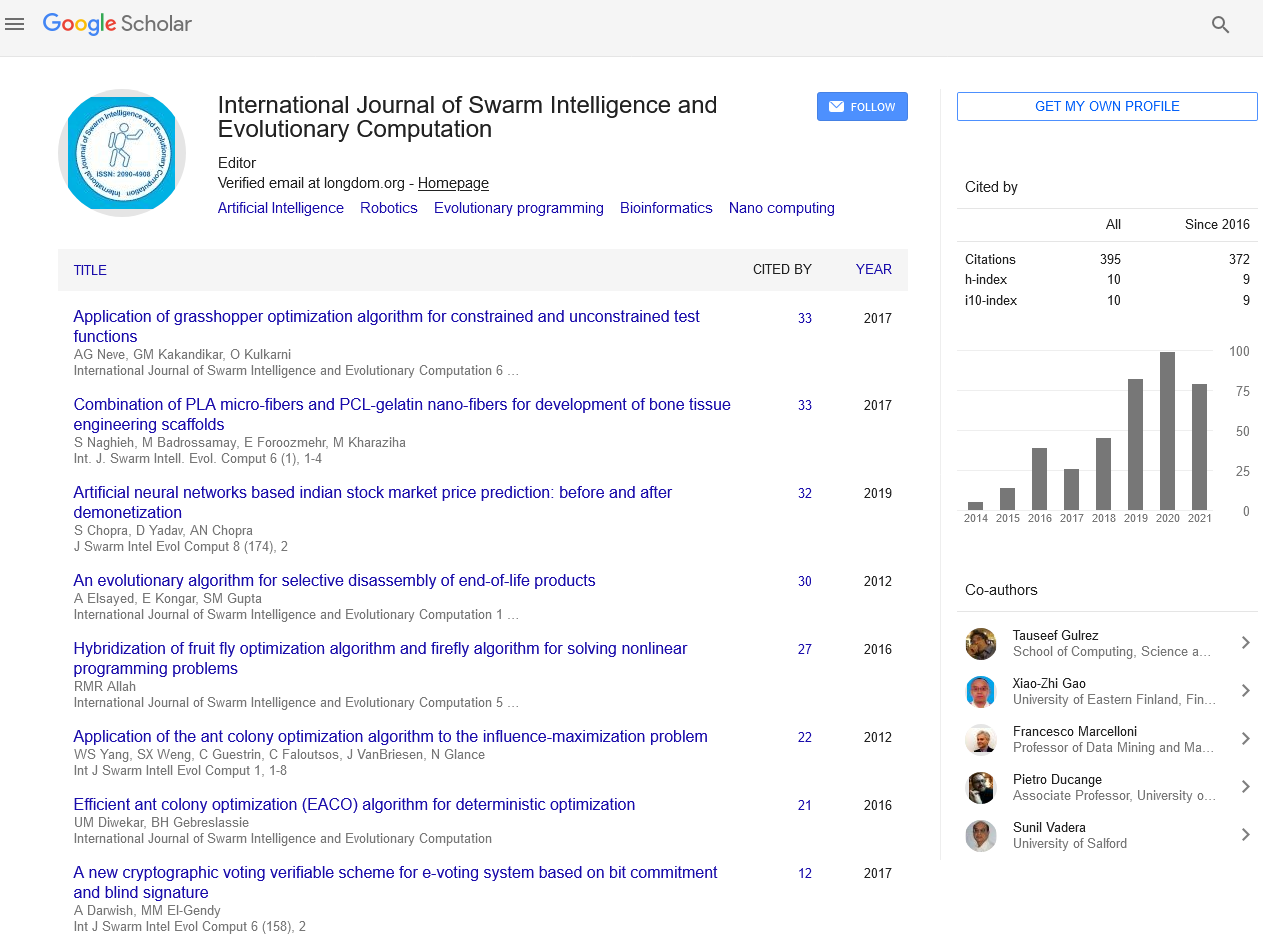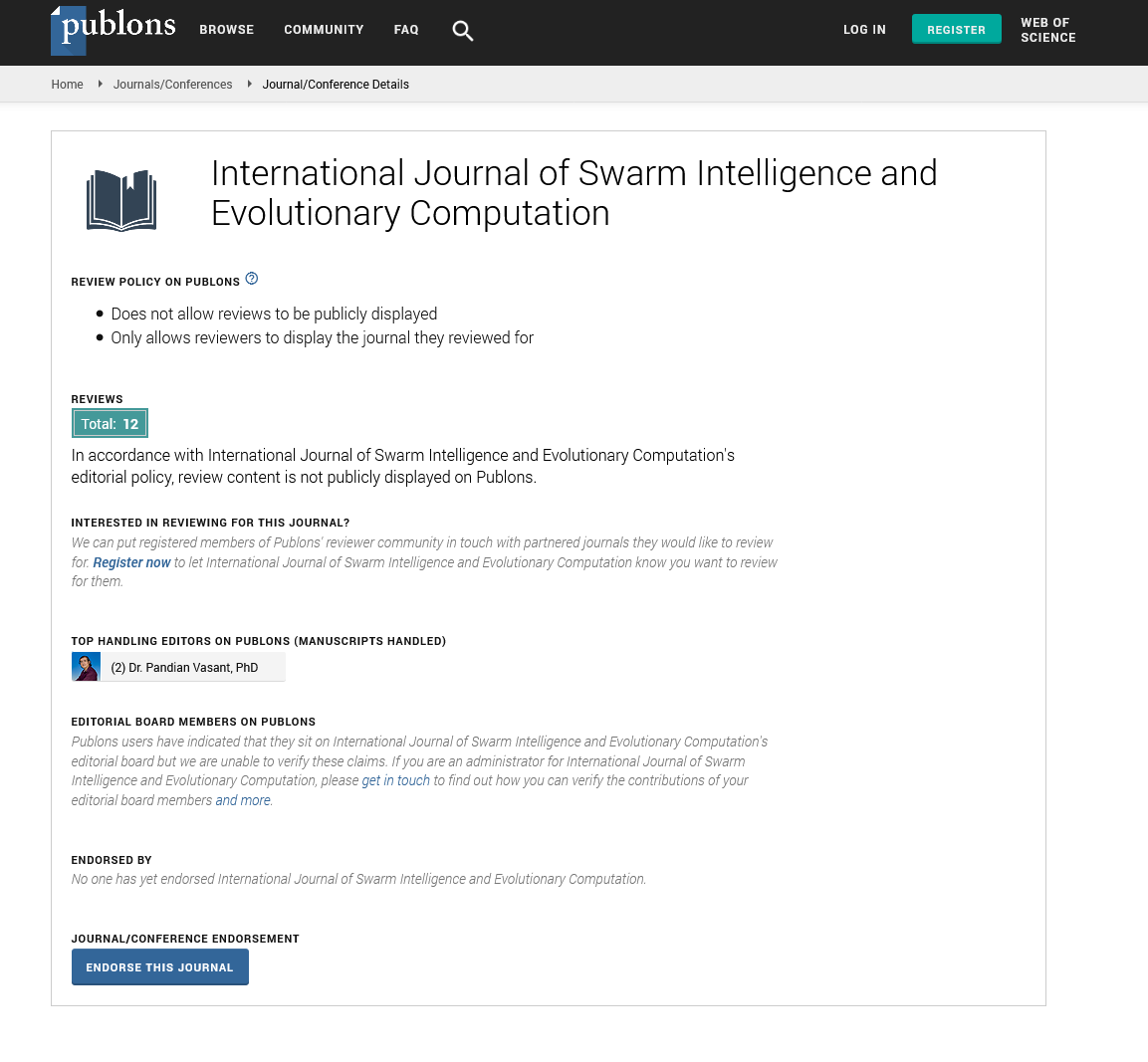Indexed In
- Genamics JournalSeek
- RefSeek
- Hamdard University
- EBSCO A-Z
- OCLC- WorldCat
- Publons
- Euro Pub
- Google Scholar
Useful Links
Share This Page
Journal Flyer

Open Access Journals
- Agri and Aquaculture
- Biochemistry
- Bioinformatics & Systems Biology
- Business & Management
- Chemistry
- Clinical Sciences
- Engineering
- Food & Nutrition
- General Science
- Genetics & Molecular Biology
- Immunology & Microbiology
- Medical Sciences
- Neuroscience & Psychology
- Nursing & Health Care
- Pharmaceutical Sciences
Commentary - (2023) Volume 12, Issue 3
Algorithm Design and Analysis in Modern Computing
Liang Gang*Received: 21-Apr-2023, Manuscript No. SIEC-23-21824; Editor assigned: 24-Apr-2023, Pre QC No. SIEC-23-21824 (PQ); Reviewed: 10-May-2023, QC No. SIEC-23-21824; Revised: 17-May-2023, Manuscript No. SIEC-23-21824 (R); Published: 25-May-2023, DOI: 10.35248/2090-4908.23.12.312
Description
The design and analysis of algorithms is a fundamental discipline within computer science, focused on developing efficient and optimal solutions to computational problems. It encompasses the art of crafting algorithms that solve specific tasks, as well as the science of evaluating their efficiency and performance. A welldefined problem statement is essential to ensure that the algorithm correctly solves the intended problem. The problem definition encompasses factors such as the input data, desired output, constraints, and specific requirements of the problem.
Algorithm design techniques
Various algorithm design techniques are employed to create efficient algorithms. Some commonly used techniques include:
Greedy algorithms: Greedy algorithms make locally optimal choices at each step, aiming to achieve a global optimal solution. They are typically fast and straightforward but may not always yield the best overall solution.
Dynamic programming: Dynamic programming breaks down complex problems into overlapping sub problems and solves them in a bottom-up or top-down manner. It optimizes the solution by storing the results of sub problems to avoid redundant computations. The famous example of dynamic programming is the Fibonacci sequence.
Algorithmic efficiency analysis
The analysis of algorithmic efficiency focuses on evaluating an algorithm's performance in terms of time complexity, space complexity, and other relevant metrics. Efficient algorithms strive to minimize time and space requirements while maximizing their effectiveness. Several methods are commonly used to analyse algorithmic efficiency:
Asymptotic analysis: Asymptotic analysis provides a high-level understanding of an algorithm's behavior as the input size grows.
It focuses on the dominant factors that influence the algorithm's performance and expresses them using big-O notation.
Space complexity: Space complexity measures the amount of memory or storage space an algorithm requires solving a problem. It is essential to consider the algorithm's memory usage, especially in resource-constrained environments.
Worst-case, Average-case, and Best-case analysis: Algorithms can be analyzed based on their performance in different scenarios. Worst-case analysis provides an upper bound on the algorithm's performance for the most challenging inputs, while average-case analysis considers the expected performance over a distribution of inputs. Best-case analysis determines the algorithm's performance under the most favorable conditions.
Conclusion
The design and analysis of algorithms form the bedrock of computer science and play a pivotal role in solving complex computational problems efficiently. By employing various algorithm design techniques and carefully analyzing their efficiency, it can develop algorithms that are optimized for speed, resource usage, and effectiveness. Understanding problem domains, employing appropriate design paradigms, and utilizing efficient analysis techniques ensure the creation of algorithms that drive technological advancements across diverse fields. In computer networks, efficient routing algorithms enable data to be transmitted quickly and reliably. In artificial intelligence and machine learning, sophisticated algorithms are developed to process vast amounts of data and make intelligent decisions. The ability to design algorithms that strike a balance between time, space, and accuracy is crucial for meeting the demands of modern computing. The impact of algorithm design and analysis extends to a wide range of fields, powering technological advancements and innovation. As computing continues to advance, the importance of algorithmic efficiency and optimization will remain paramount in shaping the future of technology.
Citation: Gang L (2023) Algorithm Design and Analysis in Modern Computing. Int J Swarm Evol Comput. 12:312.
Copyright: © 2023 Gang L. This is an open-access article distributed under the terms of the Creative Commons Attribution License, which permits unrestricted use, distribution, and reproduction in any medium, provided the original author and source are credited.


